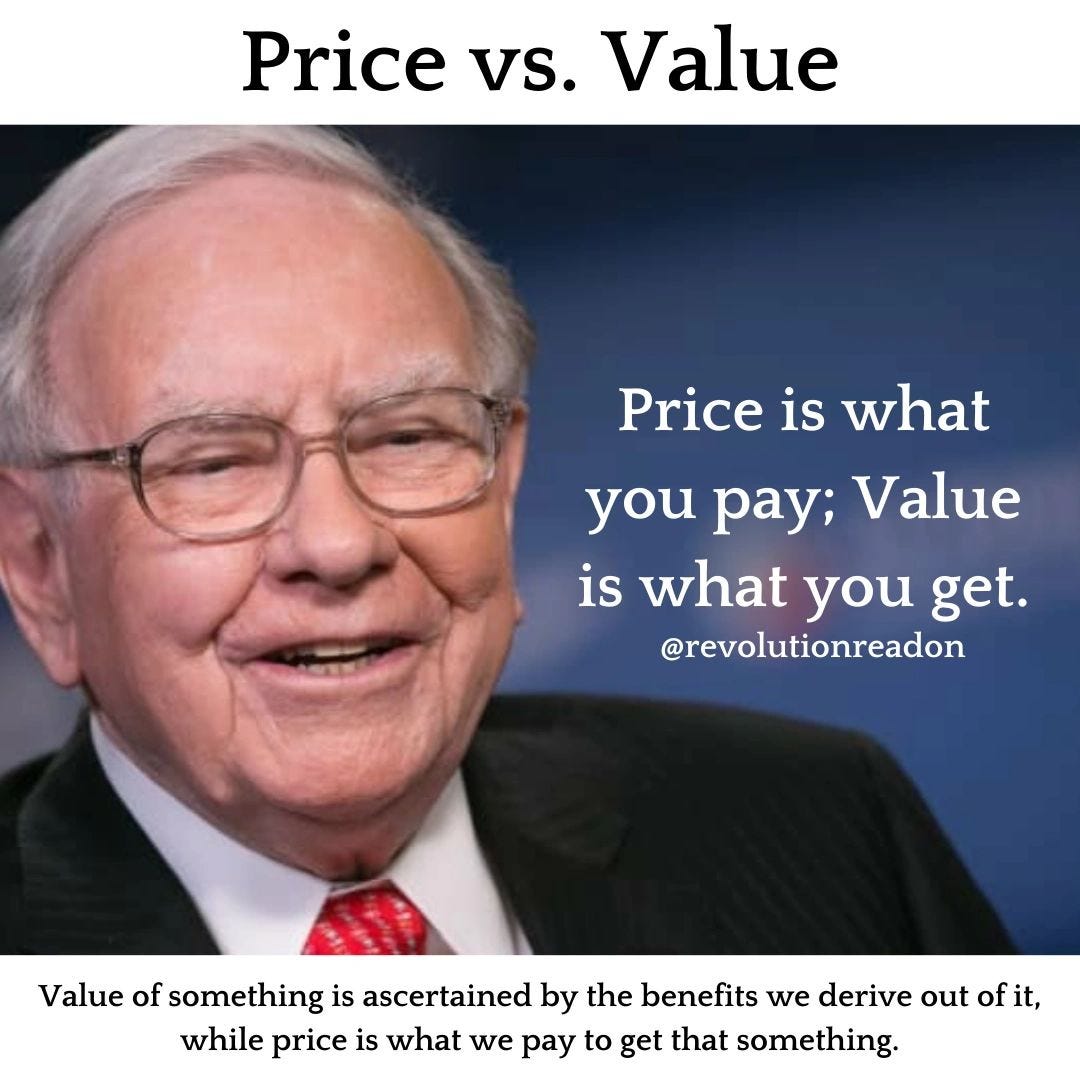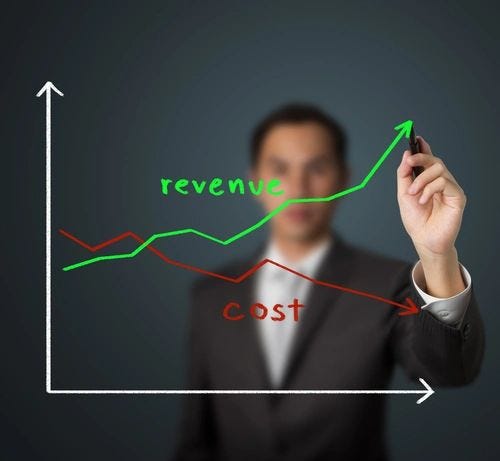Decoding Price and Value
We often use the words price and value interchangeably. That could be a pricey mistake. How? Read on.
“Price is what you pay. Value is what you get.” Warren Buffett has repeated this mantra numerous times over the years. This principle has guided his investment decisions over decades and made him filthy rich.
However, we often use the words price and value interchangeably.
That could be a pricey mistake. Let us try and understand what the terms ‘price’ and ‘value’ mean.
I will take my own example today. I work at Swiggy with the Business Consulting team. Our job is, in essence, to help the company increase revenue or optimise (reduce) costs. Every quarter, we are evaluated on the value we have delivered.
How is this ‘value we have delivered’ determined? In crude terms, it is determined by the amount of revenue we helped increase or cost we helped reduce.
Say I was able to reduce the inventory cost by 10% (Rs. 100 lakhs) in a year. Rs. 100 lakhs is the value I delivered.
Hence, Rs. 100 lakhs is my value for Swiggy.
Does Swiggy pay me Rs.100 lakhs a year? I know they are a start-up, but they are not that crazy. They pay me as per the ‘industry standards.’
Now, let us assume that I can replicate this performance at a larger company, one which has a larger inventory cost of Rs. 10,000 lakhs. A 10% reduction would imply Rs. 1,000 lakhs saved by me for the company.
So, now my value is Rs. 1,000 lakhs for this company. Wow.
Suddenly, my value increases from Rs. 100 lakhs to Rs. 1,000 lakhs. 10 times. Am I a super genius, who could increase his value 10x by switching companies? Or is it because of the larger size of the company that the value increased? Don’t think too much. It is because the company is larger that the amount of cost I could reduce was so high. I have done nothing but given a constant 10% performance.
Do you think this larger company will pay me 10x more than what Swiggy does? They won’t (if a hiring manager is reading this and wants to pay 10x more, I am more than happy to talk to you :P).
Now you are thinking - but why not? If I can save Rs. 100 lakhs for Swiggy, they could pay me, say Rs. 50 lakhs and still save Rs. 50 lakhs every year?
You are right.
They could. But, as fate would have it, I am not the only person who can save this cost for them. There are lots of capable folks out there who could do this for Swiggy. Hence, my price (salary) is not only determined by the value I deliver, or could deliver, but also by forces of demand and supply.
Since other folks with similar talent are available, my price is lower than the value I generate. As jargonists would call it, my price has been pushed down by competitive forces.
Also, the larger company for which I could save Rs. 1,000 lakhs could pay me that kind of dough, but they won’t. Competitive forces are acting against me.
But, would they pay me more than the fresher who just qualified? Yes. My past performance is indicative of what I can deliver in the future. They take lower risk when they hire someone with a proven track record. Hence, my price increases a bit (but not commensurate to my value).
Now, would someone pay me more than the total value I generate? No.
Hence, your value is the maximum price that you can fetch. Not more; but definitely less.
Key Takeaways
Value is intrinsic, comes from within, and is influenced by the product’s reaction to the external environment. It is subjective.
Price, on the other hand, is determined by the intrinsic value, forces of demand and supply, competitive forces, past performance (quality), etc.
My salary is what Swiggy pays me (price). The amount of savings that I deliver is what they get (value). Hence, price is what you pay. Value is what you get.
The Stock Market Connect
Overvalued and under-valued are two terms jargonists in the business world love to use when talking about companies and stocks. Here’s what they mean:
Undervalued: When Value of a company > Price quoted on a stock exchange. (Well, it should technically be called under-priced. But, whatever).
Overvalued: When Value of a company < Price quoted on a stock exchange.
Stock exchanges are places where one buys and sells shares of a company. A ‘share’ in a business implies your proportionate share in profits and losses of the company.
A share of Reliance selling for Rs. 1,400 is the price of that share. Not its value. Its value is determined by factors such as profits it generates, future prospects of the company, management that runs the company, and other ‘intrinsic’ factors.
That's what Buffett, and other "value-investors" do. We try and assess the true value of companies, compare it with the price quoted on stock markets, and buy if the value is more than the price.
Arriving at the value of a company is an arduous task, and prone to errors. So, what do we do to overcome this problem of inaccuracy? We look at the excess of value over price.
Say we calculate the value of a company to be Rs. 100 crores. This company is available for sale at Rs. 80 crores (price). That gives us a Rs. 20 crores excess of value over price.
This Rs. 20 crores is our safety net, our cushion against errors. Jargonists call it the 'margin of safety.'
Margin of safety % = (Value - Price)/Price % (in our example, this is 25%).
The higher this 'margin of safety,' the better the bargain. It serves well to have the largest possible safety net, right?
Can you calculate Swiggy's margin of safety considering that they pay me Rs. 50 lakhs per year and I save Rs. 100 lakhs per year?
A 100% safety cushion. That's cool, eh?
Those who are inquisitive about how to value a company - patience. One step at a time. We will get to that. Soon.
If you are one of those super impatient ones, read The Warren Buffett Way to understand how he values companies.
For now, just make sure that whenever you pay for something, you think about the value that you will get out of it. As long as the value is more than the price, you win.
Hard-wiring this concept in my brain helped me become a better financial decision maker. I hope it will help you too.
ReadOn: Delivering valuable lessons at no price :)
Thousands of readers get our daily updates directly on WhatsApp! 👇 Join now!


